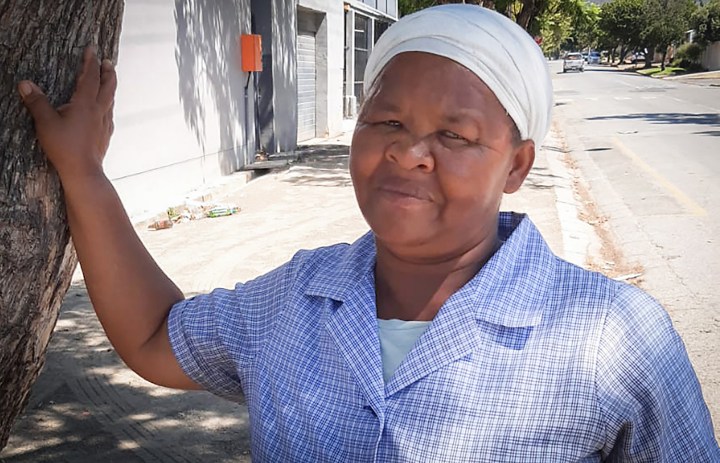LEGAL AID HEADACHES
Hope fades as evicted farm resident Tannie Sephia battles to keep her home

Amid growing hunger and homelessness, the plight of evicted farmworkers is deepening, especially when the agency that should be their last hope seems to offer none.
Tannie Sephia Kerneels cuts a forlorn figure outside the Robertson Magistrates’ Court. Her body language tells the story of someone who is waiting without much hope.
She has been evicted from the farm cottage she has lived in for the past 27 years. Her expression and demeanour reflect the unfairness she expects from authority figures and officials.
The 52-year-old widowed mother of two owes more than a year’s rent on the farmworker’s cottage she lives in. She moved into the cottage 27 years ago when her husband, Abraham Kerneels, got a job on the farm, after which they both worked there.
Sephia Kerneels was widowed when her husband, while still employed on the farm, died on 13 June 2021. She was then working in the town. After her husband’s death, she was allowed to remain in the cottage, but had to pay a monthly rent of R180, which steadily increased. In 2022 she was told she would have to move if she could not pay the rent.
By then, the rent had reached R400. She couldn’t afford to pay it in addition to feeding three people and covering all other living expenses. Her 16-year-old son and 14-year-old grandchild live with her and go to school in the area.
After the rent was increased, an eviction notice soon followed. She was also told she could no longer use the farm transport to get to and from work and home.

Widowed Sephia Kerneels (foreground, right) waits to go into the Robertson Magistrates’ Court on Friday, 2 February 2024. (Photo: An Wentzel)
She said, “Ek hike elke dag, en loop so ver ek kan”, which is to say she hitchhikes every day, in both directions and often has to walk most of the way. Since 2019, she has been living with arthritis in a knee and ankle which has left her with a permanent and painful limp which is exacerbated by winter’s cold.
Kerneels says at least she does not have to worry about transport for the children as they get to school and home via the school bus. But for her, winter travel is most dangerous because she has to cross a river to get to town and she wants to leave the farm and find a home closer to the town.
Seeking help
On Friday, 2 February, she was outside the Robertson Magistrates’ Court to meet Legal Aid to seek help. Joining her was Denia Jansen of the Rural Legal Centre (RLC), a substructure of the NGO Trust for Community Outreach and Education (TCOE).
Jansen offers support, especially to landless people, on issues of land access, land governance and rural democracy.
She works closely with the Socio-Economic Rights Institute and the Commercial, Stevedoring, Agricultural and Allied Workers Union (CSAAWU) to assist workers evicted from farms. Late last year they attained a victory when eight evicted families were bought homes after discussions and negotiations with the farm owner.
After waiting for two hours, at around 10am, Kerneels was at the head of a queue of some 15 people in a narrow corridor inside the court buildings, which smelled of mould and perspiration. She was called into the Legal Aid office and entered with Jansen, who introduced herself and Kerneels, and said they had brought along a journalist who was following the widow’s story.
The Legal Aid official said he would lose his job if he spoke to a journalist.
Daily Maverick left and caught up with Jansen and Kerneels an hour later.
Both women were dispirited, with Kerneels even more dejected than before.

The Western Cape town of Robertson. (Photo: An Wentzel)
Jansen, who has worked at TCOE for more than a decade, is passionate about assisting farmworkers and helping to prevent them from losing their homes.
She said farm owners relied on the ignorance of farmworkers, many of whom were unaware of their rights and how to access them. In the case of Kerneels, she said Esta — the Extension of Security of Tenure Act — came into play.
“Esta protects [the workers/occupiers] but still the farm owners want them out — they still take the cases to court… The farm owners don’t believe or don’t follow the Act. They still apply for the eviction.”
Deneco Dube, the deputy general secretary of the farmworkers’ union CSAAWU, said farm evictions were a national problem and the union was starting chapters in the Free State, KwaZulu-Natal and other provinces.
He said that in Kerneels’ case, because there was a contract between the farmer and the husband, and the wife lived in the cottage, she had rights of occupancy.
“The wife had occupational rights and so has never paid rent because her husband paid… [She] has to go to court to establish that she has lived there for over 20 years without paying rent and should be able to continue.”
But as she explained to Daily Maverick, Kerneels does not want to remain on the farm. She wants to be closer to town and not have to worry about crossing a river to get to and from work and home.
Her hope is that she will have her day in court and achieve an outcome which sees the farm providing her with a place to live, away from the farm. However, after her meeting with Legal Aid, she was not hopeful.
Jansen said, “That [Legal Aid] guy was so arrogant and he would not even talk to me or allow me to talk to Tannie Sephia during the consultation. But it’s not even just him.
“I don’t think [the Legal Aid lawyers here] care about winning the cases. The success rate is very low; I think they are just ticking boxes to say they assisted x number of clients.”

The Legal Aid office, third floor, Reserve Bank Building, Cape Town. (Photo: An Wentzel)
At the Legal Aid SA office in Cape Town a few days later, the receptionist gives this reporter a sideways once-over and sniffs “journalist” before saying: “Wait here; I will find someone to talk to you.”
Some 15 minutes later a young woman arrives and says she will call the media officer, Boitumelo; she says she cannot recall his last name.
When asked whether Legal Aid would fire a lawyer who spoke to the media, Boitumelo responds that the lawyer and client have a privileged relationship, so the lawyer is trying to defend the client.
“Even if the client does waive her rights it’s still a privileged conversation,” he said. “That’s just the way our media policy works; we try not to involve any third persons.” Especially, it would appear, when the third person is from the Fourth Estate.
Questions were emailed to Boitumelo and a response came a few days later from Thabiso Mbhense, a Legal Aid SA land rights management executive.
The gist of it was that Legal Aid SA in the Western Cape “is currently handling 117 farm eviction matters allocated to its internal (salaried) legal practitioners and 120 farm eviction matters allocated to Judicare legal practitioners (external service providers).
“In the current financial year, internal legal practitioners successfully finalised 12 farm eviction matters and Judicare legal practitioners successfully finalised 17 farm eviction matters.”
Mbhense said this showed they were not just “ticking boxes”.
“The statistics mentioned above depict a different picture… Legal Aid SA has had much success with Esta-related matters.”
Legal Aid SA’s definition of success — some 11% of cases are successful, but they did not qualify what this success meant for the client — seems to support Jansen’s frustration with their service.
“I don’t think they care about winning the cases,” Jansen said. “They give no indication of wanting to win a case. Most of the time they seem to be finding ways of how not to go to court and just explain why there are no grounds to go to court.” DM



















ANC fights for these people
you mean it is trying the EWC and failing miserably as it should
It’s not “her” home, it belongs to the land owner who built it. She rented the property but then could no longer afford to pay the rent, that’s just tough but she has to move on. The Landlord is right and must pursue the eviction which is legitimate and legal